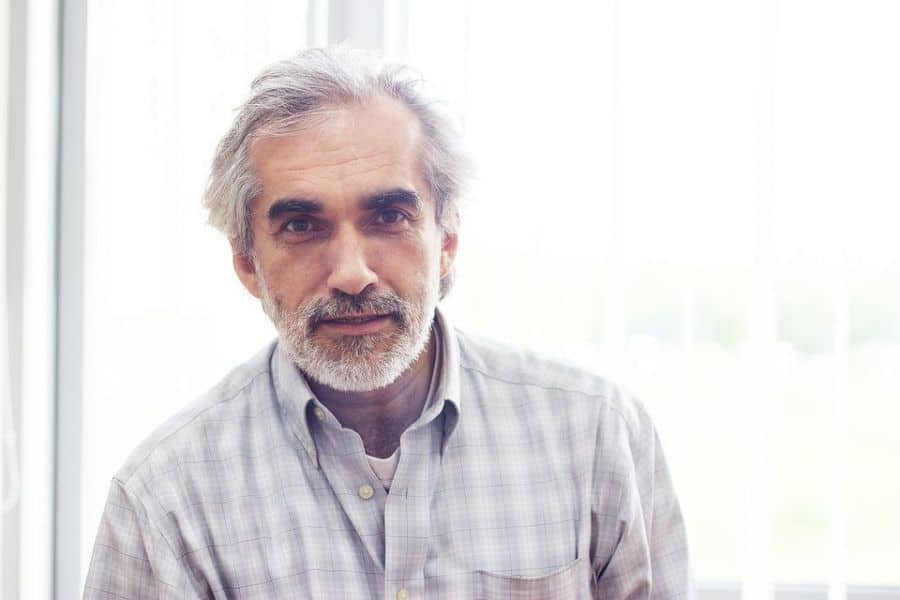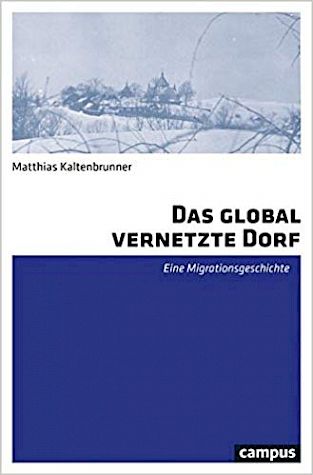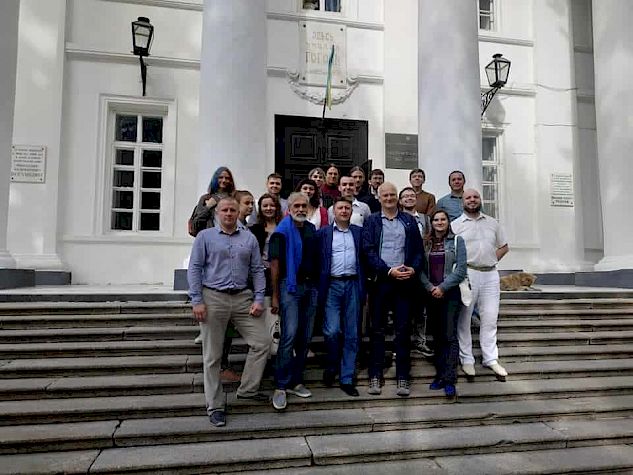Cossacks and Columbus: An Interview with Yaroslav Hrytsak
In 2018, German-Ukrainian Historical Commission organized a seminar in Nizhyn, Ukraine for young researchers. The topic was transnational and global perspectives of Ukrainian history from the early modern to contemporary times. One of the moderators of this seminar was Yaroslav Hrytsak, a professor at Ukrainian Catholic University (Lviv), editor-in-chief of Ukraina Moderna, and head of the Ukrainian section of the German-Ukrainian Historical Commission.
Yaroslav Hrytsak is one of the preeminent Ukrainian historians and public intellectuals, an expert in the modern history of Ukraine, as well as nationalism and nationhood in Eastern Europe more generally. Yehor Brailian spoke to him about global history, his upcoming book on short Ukrainian history, and the next generation of historians in Ukraine. Prof. Hrytsak suggests global history may help us to understand the nature of political and cultural encounters in the Ukrainian lands, beginning from the Cossack period (XVI-XVIII centuries).
– Yehor Brailian (Taras Shevchenko National University of Kyiv)

YEHOR BRAILIAN: When and why did you decide to become a historian?
YAROSLAV HRYTSAK: That's a very tough question. I think it probably came from my teenage dreams. First I wanted to become a rock star. I made the choice to become a historian after reading one book in particular. This book, written by Czech journalist Vojtech Zamarovský, was about the seven miracles of the ancient world. It was so well written, especially the chapter on ancient Egypt. After this book I decided to become an Egyptologist, like [Jean-François] Champollion, to study Egyptian texts and that kind of thing. When I graduated from high school I had a choice – mathematics (I was rather good at math) or history. I decided I'd rather be a good mathematician than a historian. But nothing is too late, and I later studied at the history department of Lviv University. Soon I discovered, with a lot of dissatisfaction that there was no chance for me to become an Egyptologist. At that time, when I entered the university, it was the Brezhnev era and nobody could really talk about anything except Soviet Ukraine and the Soviet Union. For some period of time, I decided to study the French revolution, its impact on Ukraine, but it was also infeasible. Finally, I got a PhD studying the workers' movement in Western Ukraine.
BRAILIAN: What was your first experience with global history?
HRYTSAK: Most probably after reading a book by Felipe Fernández-Armesto, 1492: The Year the World Began. It's a book on the discovery of America by Columbus. At some point I decided that this book is pivotal for Ukrainian history. That same year, 1492, is at the core of Ukrainian identity: when Cossacks appear in the historical records. That is the modern coincidence of two worlds: The New World of Columbus and the New World of Cossacks. After the discovery of America, the world became global for the first time. The idea of Ukraine emerged at that time. The world of Cossacks and Columbus came together. I like this idea so much that I wrote a book about it.
BRAILIAN: What does global history mean to you?
HRYTSAK: That's a good question. I don't really know. I am not a conceptualist. Why I chose global history or rather a global perspective is because I believe that in some cases it's the best way to explain a phenomenon. I am deeply convinced that you cannot get a sense of the Ukrainian Famine of 1932-1933 by focusing only on the Ukrainian/Ukrainian-Russian case. This phenomenon has a much larger context. But how large? How far we should go? You have to go to the maximum. And the maximum is global history.

BRAILIAN: Last year, the German-Ukrainian Historical Commission along with Nizhyn National Mykola Gogol Pedagogical University organized a seminar on global/transnational perspectives of Ukrainian history from early modern to contemporary times. You were one of the moderators of this seminar. What were your impressions of it? Is this the beginning of an analytical framework for the global history of Ukraine?

HRYTSAK: Not exactly. I wish it would be. My biggest impression from it is the emergence of a new generation of historians. These young ladies and men in their twenties who think and study differently have started a new analytical framework. This conference was a promising first attempt at how to use the approach of global history. We had a very interesting presentation from Austrian scholar Matthias Kaltenbrunner, which is probably the perfect example. This was a global history of a village in the Rakhiv region. From one perspective it shows the concept of global history and from another it shows how it works. This is the best example of a kind of applied history.
BRAILIAN: Your main book is about Ukrainian nationhood in the nineteenth and twentieth centuries. Its first edition was published in 1996, and this year it was updated. What is the main difference between your vision of Ukrainian history twenty years ago versus now?
HRYTSAK: During the '90s, the book was rather successful because it represented the spirit of that period. You had proclamations of state legitimacy in the Ukrainian case and there was a need to reflect this kind of optimism. My main point was that Ukrainian history and the Ukrainian nation is normal. There was a feeling that the Ukrainian nation was not finished (completed). If I were to write this book now, I probably would not do this again. Since I can't rewrite it, then I need to write a new book - what I am currently doing, a global history of Ukraine. Basically, I am rather skeptical of this book, because there was a particular spirit twenty years ago. At that time I believed that a nation is an essential, central point and focus of the narrative. I was using the arguments of Ernest Gellner. He wrote that national identity and nations are core elements of modernity. I tried to reflect this thesis in my book. I don't believe in it any more.
BRAILIAN: What are the most important themes in Ukrainian history that can be revisited from a global perspective?
HRYTSAK: I am very subjective. The most promising field in global history, which will help to radically rethink the Ukrainian case and also its modernity is the First and Second World Wars. This thirty-year period, the thirty years' war of the twentieth century (1914-1945), is very essential for Ukraine.
BRAILIAN: Over the last two years historians have sought to rethink the Ukrainian revolution (1917-1921) because of the centenary of it. I know that your chronology of those events is more like 1914-1923. What do you think of the current vision of the Ukrainian revolution in the historiography and in the public discourse?
HRYTSAK: Seventeen years ago, I wrote an article about new perspectives on the Ukrainian revolution. Then, two years ago here in Kyiv, there was a conference on the centenary of it. I was very surprised because at the conference historians referred to that article as a new one, as a conceptual one. I believe that my question was that the turning point of that time was the First World War, which led to the transformations in Ukraine. I haven't seen enough new reflections on this.
BRAILIAN: There have been discussions about the colonial status of Ukraine in the twentieth century. What are your reflections on this and what consequences might it have?
HRYTSAK: I am not a big fan of applying the concept of colonialism to Ukrainian history. The Ukrainian case is a very peculiar one. It does not fit the colonization paradigm. One key discussion is to what extent Ukraine could be named a colony during Russian but especially Soviet times. I don't share this view. If it was a colony, it was a very specific kind of colony. How might we explain, if Ukraine was a colony, that its local elite ruled in Soviet Union for a short time? What kind of colony is that? I have the impression that the concept of colonialism provides a rather limited perspective and does not help us to understand Ukraine. Quite often in the Ukrainian case, especially after the independence proclamation, Ukrainian scholars used the colonial paradigm to excuse Ukraine actions in many cases. I don't particularly like this kind of approach.
BRAILIAN: Another main discussion among scholars in the last five to ten years has been about inter-ethnic perspectives on Ukrainian history. After all, along with Ukrainians, Poles, Jews, Bulgarians, and other people have lived on Ukrainian territory. What do you think of this global perspective of Ukrainian history?
HRYTSAK: I would say it's a banality. Why is it a banality? Because the way it has been applied quite often in Ukrainian history is still within the limits of a national paradigm. When you write Ukrainian history in the traditional national paradigm, it includes Poles and Jews in the national paradigm. Even as this international approach tries to embrace this kind of complexity, it still focuses on the nation as the main organizing principle of the narrative. I'll give you an example in a book by Paul Magocsi called "History of Ukraine". It is a very good book because of its multiethnic paradigm. But still this book uses a very national paradigm. There is not much about urbanization or industrialization. They are beyond this national paradigm.
BRAILIAN: Some very important foreign figures were born in Ukraine. For example, Joseph Conrad, the famous English novelist was born near Berdychiv. What are your thoughts on trying to analyze Ukrainian history from the perspective of foreigners?
HRYTSAK: The context is very important. Which context is important? I don't know. You probably know Korzeniowski better than me. He became Conrad after leaving this region. If he had stayed there, nobody would have known about him. It's a very sad tendency here that if you want to become famous, you have to leave this region. There is something about this region, the limits of your intellectual scope. Probably you know that Karl Marx was the grandson of a rabbah in Lviv and the father of Freud was born in Galicia. What would have happened to them if they had stayed in Galicia? That's why it is very important to see the extent of core-periphery correlations and its impact on how people think about themselves and the world. In particular, it is still about modernity. The basic case of modernity is that you have to modernize or to die. What did it mean to modernize on the periphery? I believe these questions would be much more fruitful if Korzeniowski was a part of Ukrainian history.
BRAILIAN: One subfield of global history is the global history of the middle class. What are your perspectives on this field?
HRYTSAK: I am an editor of a peer-reviewed journal Ukraina Moderna, which has been published in Ukraine for 23 years. The most recent issue focuses on economic elites in Ukraine. It's a very good start. For the first time people in Ukraine are studying not a national history, but a history of a specific group, which is probably not quite middle class, but upper . This is something to start with. It's only the beginning.
BRAILIAN: What books about global history would you recommend?
HRYTSAK: One of my favourite books, which is not directly about global history is Language and Solitude: Wittgenstein, Malinowski and the Habsburg Dilemma by Ernest Gellner, which has very much helped me to analyze the distinction between the core and the periphery. There are some narratives nowadays where historians try to provide global perspectives on Ukrainian history. Here probably the first book would be by Serhii Plokhy The Cossack Myth: History and Nationhood in the Age of Empires. Another is a book by Christian Raffensperger about Princess Anna of Kyiv. There was a book by Dominic Lieven on Russian empire. And, for sure, Timothy Snyder, Bloodlands and Black Earth, which is probably weaker, but still a very important book. One very important example, which is unfortunately often forgotten, is the biography of Henryk Józewski in Sketches from a Secret War: A Polish Artist's Mission to Liberate Soviet Ukraine. This is a perfect example of a person's life, which can be written in a global context.

